Madeleine Leininger: Background
- Born: July 13, 1925, Sutton, Nebraska;
- 1948: St. Anthony’s School of Nursing – A Nursing Diploma;
- 1950: Benedictine College – a B.S.;
- 1954: The Catholic University of American in Washington – an M.S.;
- 1966: The University of Washington – a Ph.D. in cultural and social anthropology;
- 1969-1974: Dean & Professor of Nursing at University of Washington;
- 1974-1981: Dean & Professor of Nursing at Anthropology University of Utah;
- 1995: Clinical Professor of Nursing at the University of Nebraska;
- Died: August 10, 2012.
Madeleine Leininger was a famous American nursing theorists, whose main contribution was the creation of the theory of culture care diversity and universality in 1991. She was born in Nebraska, July 13, 1925 (McFarland, 2014). At the age of 23 years, she got her first nursing diploma. Then, she improved her knowledge and experience by getting her B.S., M.S., and, finally, Ph.D. in anthropology that allowed her taking the position of a dean at different universities of the United States (Masters, 2014). She was a pioneer of transcultural nursing who introduced a clear and strong theoretical framework.
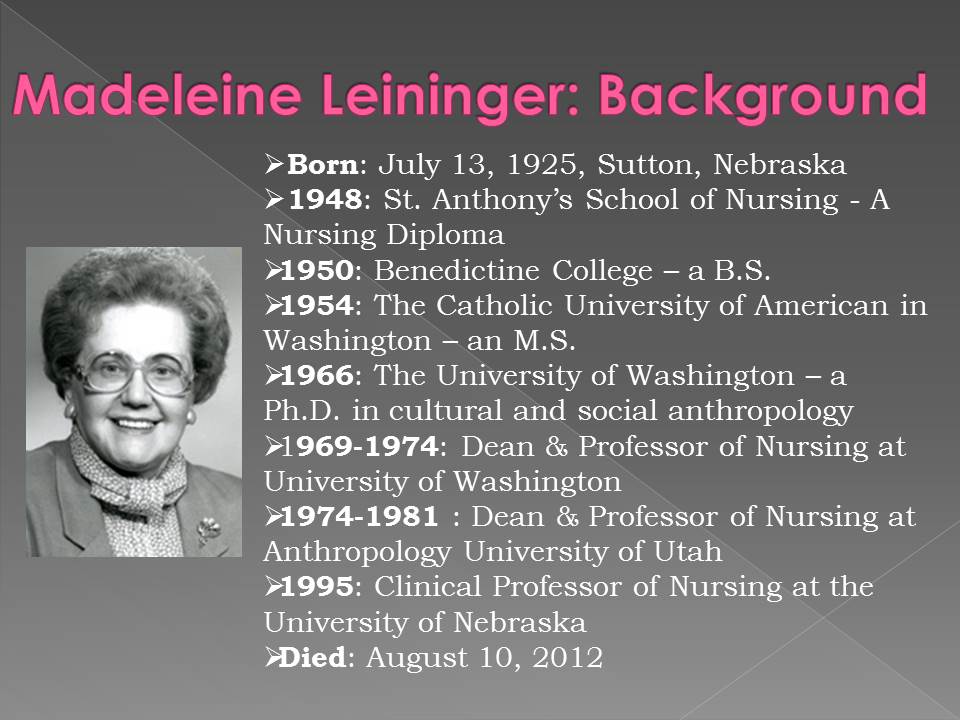
Presentation Objectives
To discuss the Theory of Culture Care Diversity and Universality developed by Madeleine Leininger, its main concepts, strengths, weaknesses, and limitations and To identify the ways of how this theory can be applied to daily advanced nursing practice and MSN Essentials 2011.
In this presentation, there are two main goals that have to be achieved. First, it is expected to discuss the chosen theory of culture care diversity and universality and the role of Leininger in the field of nursing. Her theory is characterized by a number of strong points. In addition to the identification of the main concepts of the theory, it is expected to discuss its possible weaknesses and limitations in order to achieve the second goal of the presentation that is the identification of the ways of how this theory can be applied in advanced nursing practice. Finally, it is necessary to evaluate the existing MSM Essentials to prove the applicability of the theory to the already offered standards.
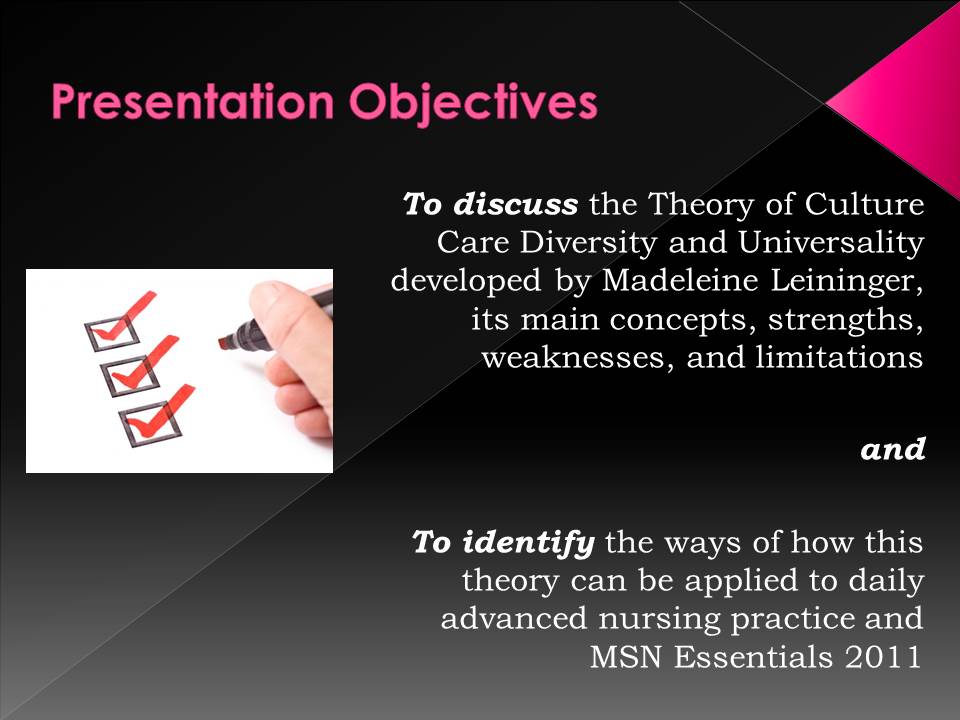
Theory of Culture Care Diversity and Universality: Usefulness
- Importance of a human care concept;
- Culture helps to understand behavior;
- Cultures differ;
- Patients have culturally diverse backgrounds;
- Behavioral differences determine care.
There are five main reasons to prove the usefulness of the Culture Care Diversity and Universality theory:
- Leininger proved the importance of a human care concept in nursing and explained that nursing metaparadigm was not as important as an understanding of cultural care in nursing (Masters, 2014).
- This theorist underlined the necessity of culture in care because it helped to understand human behavior (McFarland, 2014).
- Her theory is useful due to the recognition of the fact that cultures differ, and it is hard to use one theory or framework to comprehend all patients.
- As soon as cultures are proved to be different, it is necessary to choose an appropriate approach for work with patients who have culturally diverse backgrounds (Shen, 2015).
- Behavioral differences may influence nursing care; therefore, Leininger’s theory can help to improve nursing care by means of understanding cultural backgrounds, behavioral differences, and patients’ needs and expectations.
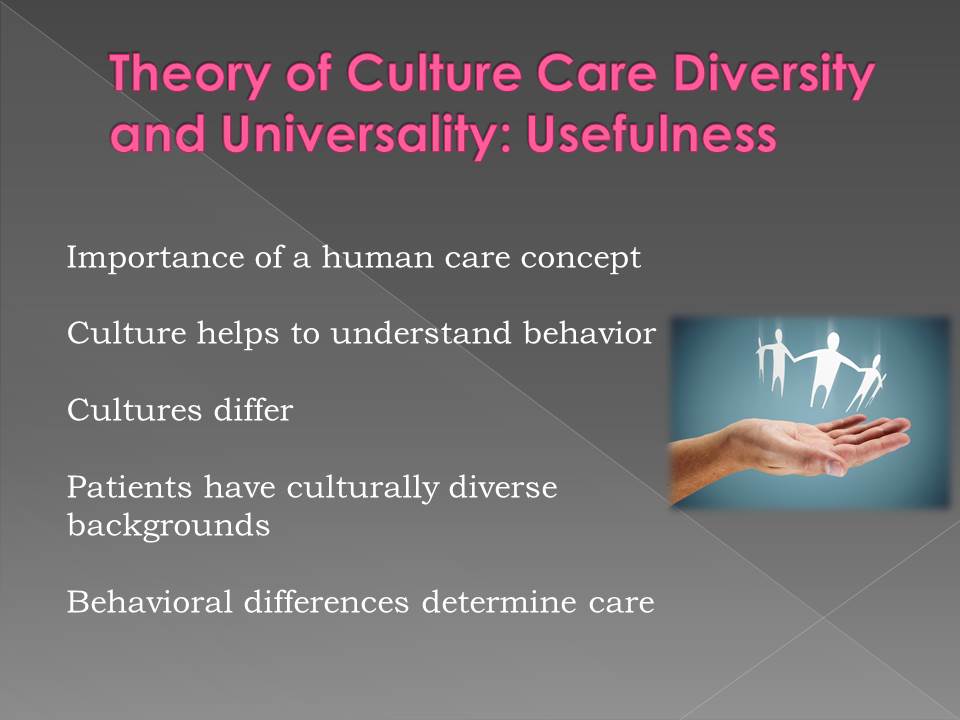
Theory’s Key Points
Cultural Care is rooted in patient’s cultural beliefs and practices and recognition of a patient as a partner in a caring process.
The Leininger’s theory is characterized by a number of concepts being important in nursing care and identified in regard to a well-known theoretical metaparadigm. Leininger interpreted four main concepts of her theory in the following way:
Health is a well-being that is culturally defined;
Person is any human being that is considered to be a part of a community with certain beliefs and interests (Black, 2016);
Environment is the context in terms of which different events, situations, and experiences are combined and give meaning to human expressions.
Nursing is a kind of art with its core of personalized care behavior of a patient (Masters, 2014);
Finally, Leininger’s definition of cultural care is integral to its further application. The theorist says that care should be rooted in patient’s cultural beliefs and practices so that any patient may become an equal partner in a caring process offered by a nurse (Shen, 2015).
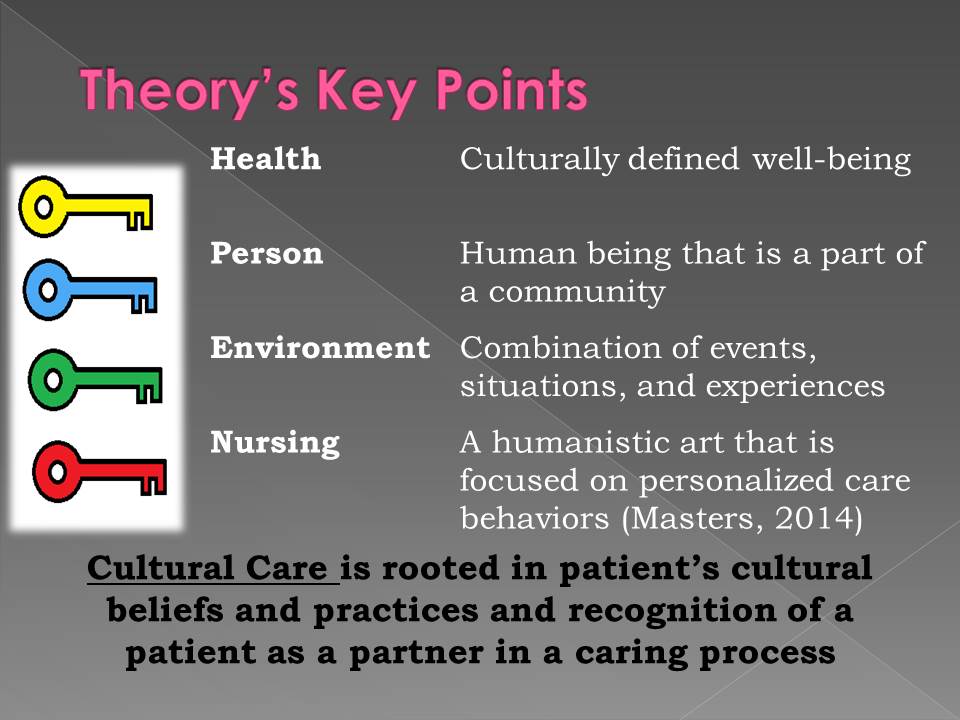
Theory of Culture Care Diversity and Universality in Advanced Practice
- Culture care preservation and/or maintenance.
- Culture care accommodation and/or negotiation.
- Culture care repatterning and/or restructuring.
In advanced practices, three modalities developed by Leininger can be used to improve nursing care (Masters, 2014):
“Culture care preservation and/or maintenance” promotes the development of supportive and facilitative professional actions when nurses rely on patient’s cultural values in a recovery process, handicap, or death.
“Culture care accommodation and/or negotiation” identifies all supportive activities offered by nurses to help patients of specific culture to communicate with other people and achieve the desired health outcomes.
“Culture care repatterning and/or restructuring” helps to understand what kind of changes and improvements have to be done in patients’ lifestyles to achieve new, beneficial outcomes.
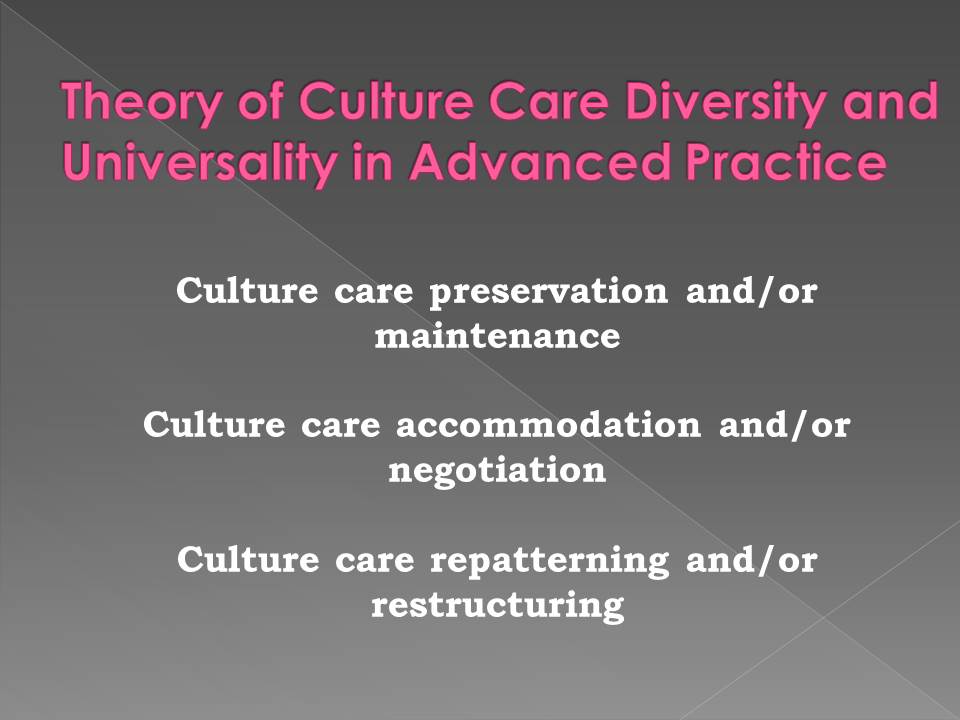
MSN Essentials Relation
American Association of Colleges of Nursing (2011):
- Essential II: Organizational and Systems Leadership;
- Essential III: Quality Improvement and Safety;
- Essential VI: Health Policy and Advocacy;
- Essential VII: Interprofessional Collaboration for Improving Patient and Population Health Outcomes;
- Essential VIII: Clinical Prevention and Population Health for Improving Health.
There are nine MSN Essentials 2011, and the Leininger’s theory is directly related to five of them (American Association of Colleges of Nursing, 2011):
- Essential II: Organizational and Systems Leadership: effective leadership depends on how well nurses understand their patients and provide them with high-quality services. Ethical decision-making is obligatory, and cultural awareness is required.
- Essential III: Quality Improvement and Safety: performance measures and tools are related to care quality, and nurses may improve care by recognizing cultural needs and preferences of their patients.
- Essential VI: Health Policy and Advocacy: the intervention at the system through policies can influence health care, and cultural backgrounds may be important for patients’ advocacy.
- Essential VII: Interprofessional Collaboration for Improving Patient and Population Health Outcomes: collaboration, communication, and team-work are necessary for care coordination in different healthcare facilities.
- Essential VIII: Clinical Prevention and Population Health for Improving Health: client-centered and organizational concepts are used in care delivery and planning, and the evaluation of patients’ populations, cultures, and norms may be rather helpful to nurses.
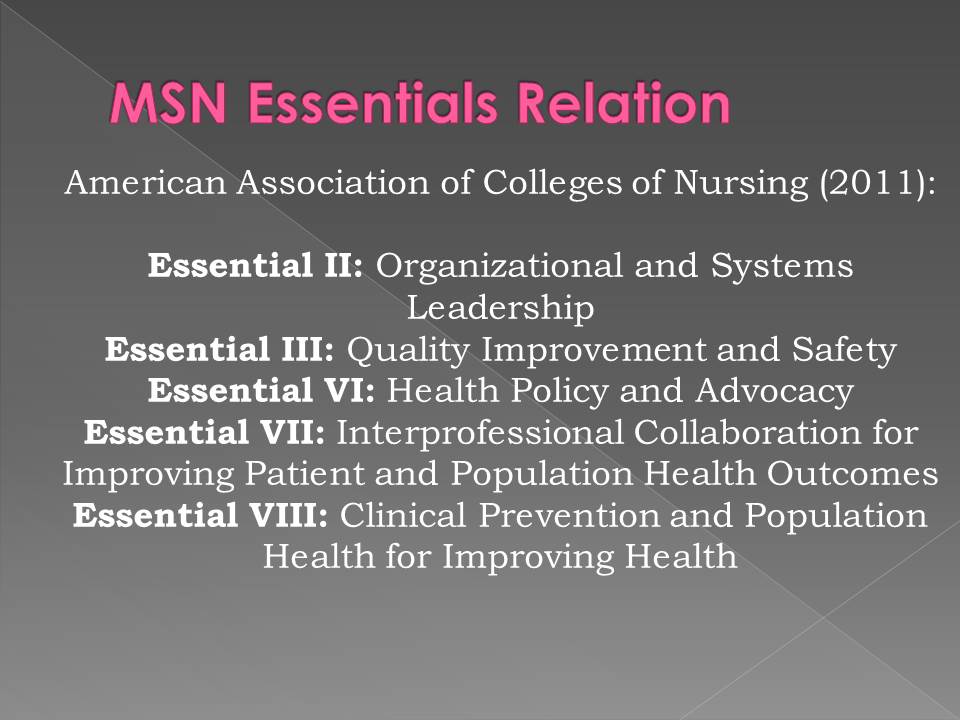
Theory of Culture Care Diversity and Universality: Strengths
- Sunrise model;
- Broad concept definitions;
- Specific concept definitions;
- Empiric indications;
- Educational influence.
Leininger’s theory strengths are:
- The presence of the Sunrise model that helps to identify a logical order of Leininger’s ideas and the importance of the chosen culturally-based approach (Black, 2016).
- There are several broad concept definitions that can be easily understood and compared to the concepts taken from other theories and frameworks.
- There are many specific concept definitions that differentiate this theory from other works and approaches and prove its uniqueness and usefulness.
- Empiric indications prove that care should vary from patient to patient, and cultural values should be tailored by nurses (McFarland, 2014).
- Educational influence of this theory cannot be neglected because it helps to improve the already known facts in the field of nursing and explains what implications can be done.
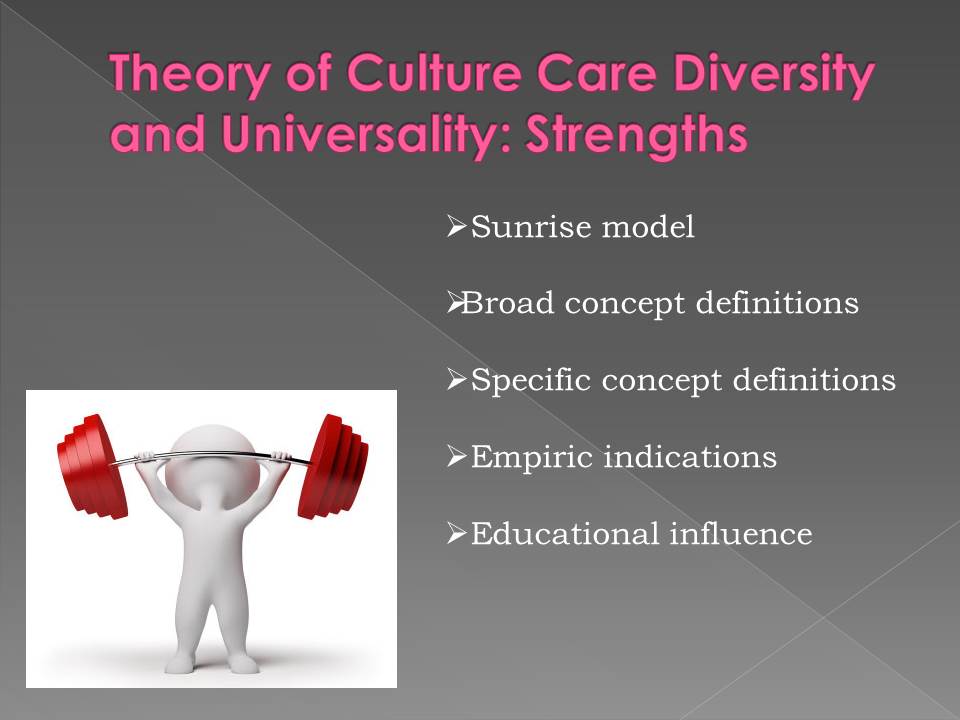
Theory of Culture Care Diversity and Universality: Weaknesses
- Complexity of the Sunrise model;
- A number of definitions;
- Not all nurses are aware of how to use the theory in practice.
Despite the existing strengths and usefulness of the theory, it is necessary to indicate its weakness and be ready to work hard to deal with all those shortages and problematic areas:
- Not all people may understand how to use the Sunrise model and be confused by the complexity of its construction. What is more important, many potential users just do not want to spend their time to gain an understanding of the model and continue using it.
- Some people are challenged by the presence of numerous definitions in this theory. Leininger finds it necessary to focus on every concept separately; therefore, it is necessary to remember many definitions at once.
- Finally, not all facilities aim at studying this theory thoroughly. Therefore, not all nurses know how to use this theory in practice. They may learn its basic concepts and definitions, but fail to use it properly.
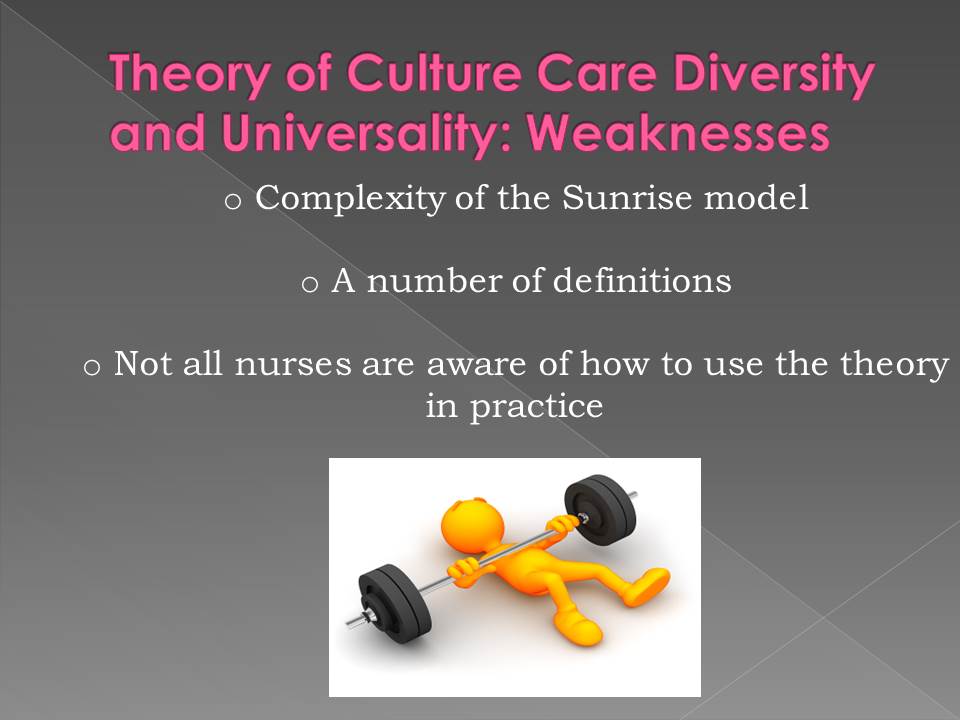
Theory of Culture Care Diversity and Universality: Limitations
- Not many nurses are aware of culture care nursing;
- Not many facilities are based their care and services on cultural understanding of patients.
There are no many limitations of the Leininger’s theory at this moment. Still, there are two main areas that have to be taken into consideration:
- The main limitation is that not all nurses are actually aware of culture care nursing as the main approach in their practice. They may know what cultural knowledge is important, but they fail to grasp all its context.
- Another important issue is the fact that not all facilities are ready to work according to the Leininger’s framework. Though it is expected to consider cultural diversity among patients, it should not be a core of nursing care.
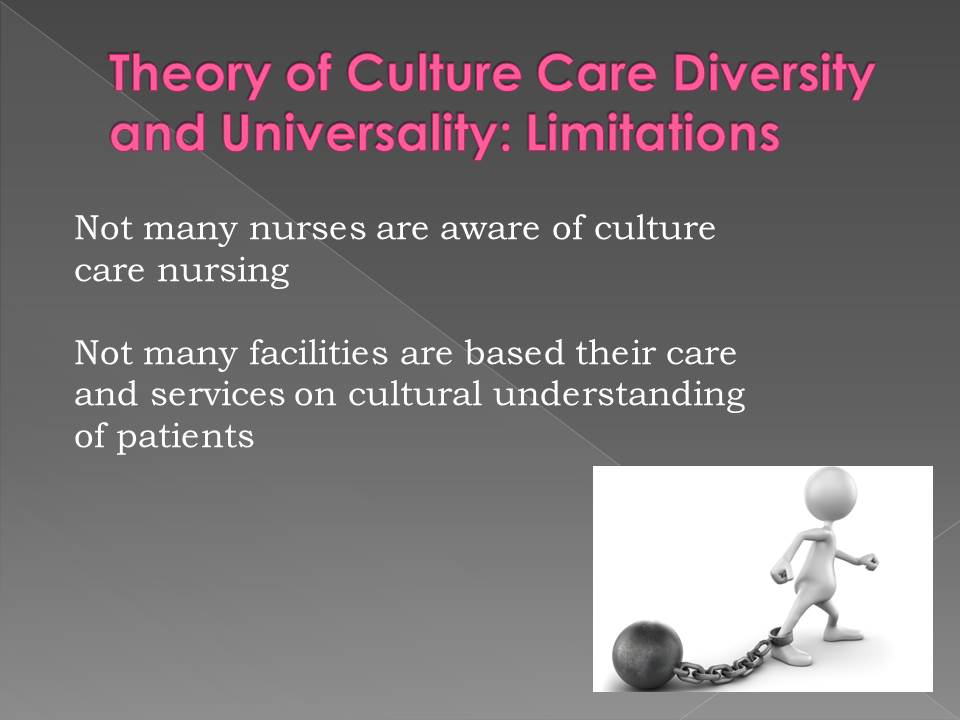
Theory of Culture Care Diversity and Universality: Applying
- Transcultural nursing in human care;
- High-quality care for all patients;
- Avoidance of legal suits;
- Improvement of communication in hospitals.
Nowadays, there are many different ways to apply the Leininger’s theory of Culture Care Diversity and Universality in nursing practice. Some of them are:
- The possibility to underline the importance of transcultural nursing in human care. Nurses should understand that their knowledge of patients’ cultural backgrounds is one of the possible steps to improve care.
- All hospitals aim at improving their services at different levels. Cultural diversity should not be a challenge for nurses, and this theory is a good solution to be followed by nurses.
- If nurses know how to behave with culturally diverse patients, they face fewer problems from the legal point of view and get a chance to avoid legal suits in their practice.
- Finally, communication is a core of nurses, and culture care is a good opportunity to succeed in communication that has to be developed between patients and nurses.
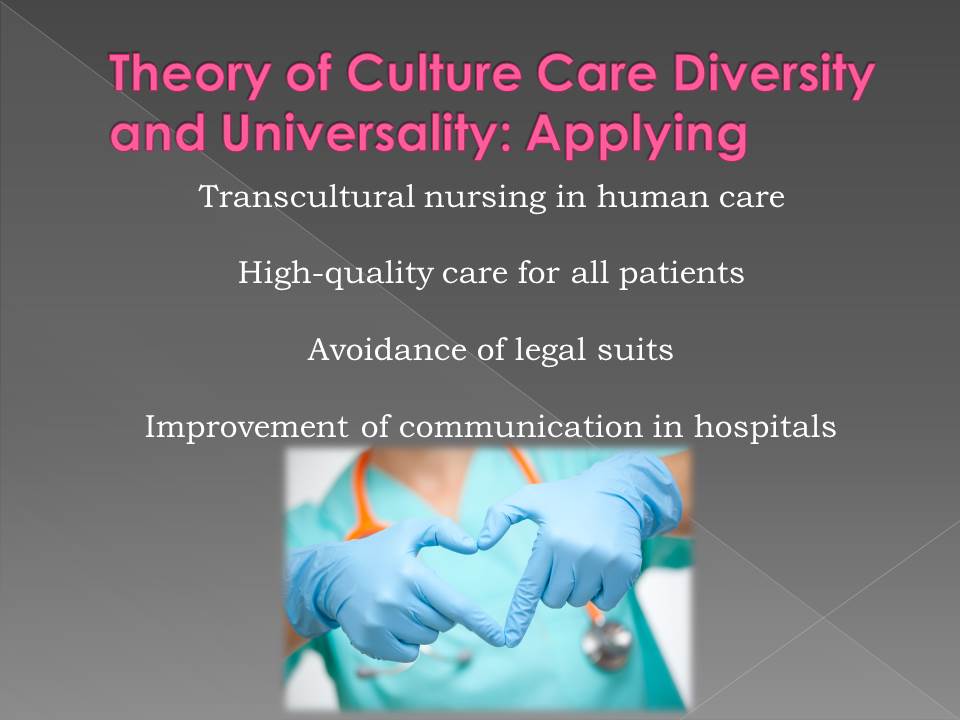
References
American Association of Colleges of Nursing. (2011). The essentials of master’s education in nursing. Web.
Black, B. (2016). Professional nursing: Concepts & challenges. St. Louis, MO: Elsevier.
Masters, K. (ed.).(2014). Nursing theories: A framework for professional practice (2nd ed.). Burlington, MA: Jones & Bartlett Publishers.
McFarland, M.R. (2014). Madeleine M. Leininger: Culture care theory of diversity and universality. In M.R. Alligood (Ed.), Nursing theorists and their work (pp. 417-441).St. Louis, MO: Elsevier.
Shen, Z. (2015). Cultural competence models and cultural competence assessment instruments in nursing: A literature review. Journal of Transcultural Nursing, 26(3), 308-321.